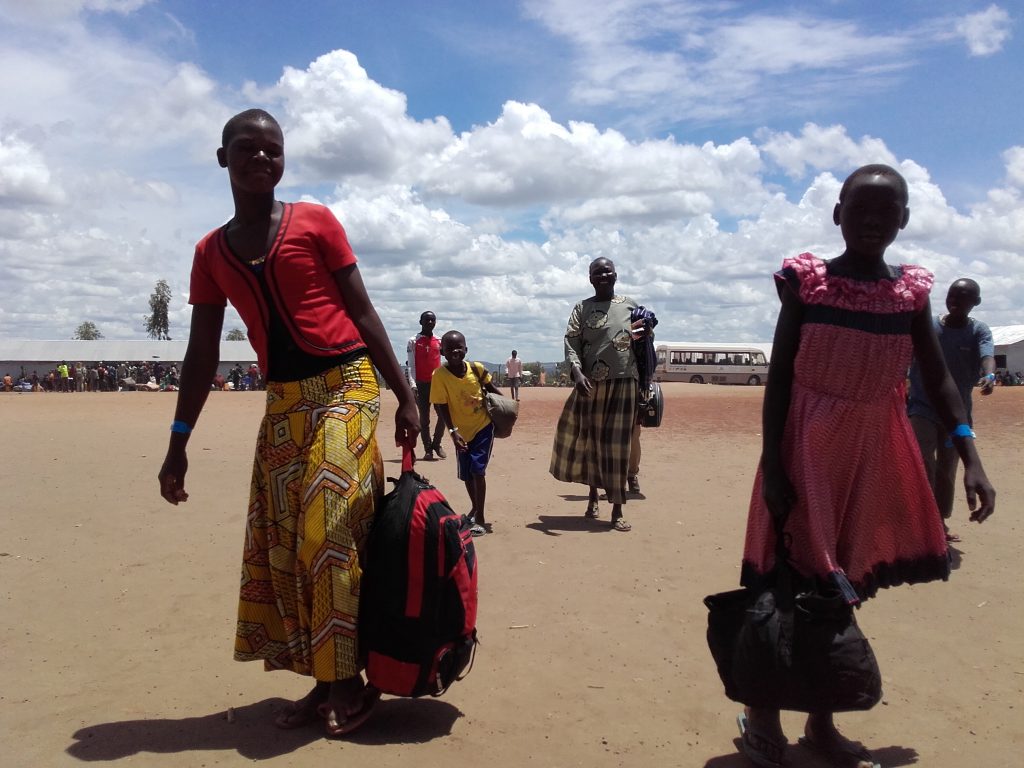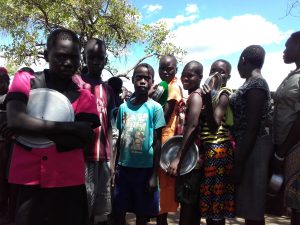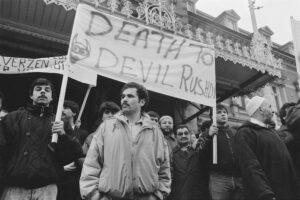Uganda’s refugee crisis, part 1: “Back home, all we could hear were guns and screaming”
By Boštjan Videmšek/DELO
Northern Uganda houses more refugees than entered the European Union during the peak of the “refugee crisis”. And Uganda has only 8% of the EU's population and a fraction of its resources.

Read part 2
Monday 26 June 2017
It was lunchtime at the Impevi refugee camp and registration centre in the Ugandan West Nile province. Hundreds of children had formed an orderly queue under the white tarps of the UNHCR, the United Nations' refugee agency. The children were refugees from the horrendous war raging just a few kilometres away in South Sudan. Their eyes, sunk deep into their emaciated faces, were shining with anticipation. They were clutching one aluminium plate each and waiting for their first meal of the unbearably hot day.
The heat had long glued the atmosphere into a stifling, static soup. Now and then, one of the boys' faces broke into a bashful smile. The mothers were standing nearby, dignified if a bit distracted while waiting in their own long queues. There were very few adult men around, barely enough to form a sample. This demographic metaphor of the world's most urgent and also most under-reported refugee crisis could hardly be any more clear-cut. And any more telling.
Uganda, with its population of 39 million, is now host to more than 1.2 million refugees. Some 900,000 of them are from South Sudan.
Uganda is renowned for being the continent's most hospitable country to refugees. Most of the ones currently staying here had arrived in the last 10 months. As many as 65% are under the age of 18 and 85% of them are women and children. Uganda is currently hosting more refugees than entered the entire European Union, with its affluent population of half a billion citizens, at the peak of the “refugee crisis” in 2015. According to estimates, by the end of this year, at least another half a million refugees are sure to arrive in Uganda, all of them fleeing the horrors of war.
The conflict in South Sudan, the world's youngest country, is only growing in scope. After the republic declared its independence in July 2011, it quickly descended into war: this time not against the north and the Islamist regime in Khartoum, but against some of its own peoples. Ethnic violence erupted near the end of 2013 following the clash between president Salva Kiir and his deputy Riek Machar. This then exploded into an all-out civil war. This is a war marked by ethnic cleansing, unspeakable savagery, famine, pronounced disinterest from the international community and the western media – and of course by the endless columns of refugees furiously marching southward.
The thing is: south is the only direction for them to run. Their flight is in no way a bid for a better life but rather a desperate scramble for survival. As far as they are concerned, there can be no such thing as ‘a better life': war is all they know and all they have ever known. Thousands of them are now refugees twice over, and many have fled to Uganda for the third time.
“They are murdering us – they're killing us like flies! Help,” Bill Mahas, 19, called out from a cluster of exhausted teenagers in threadbare clothes, skirted by a number of half-naked toddlers. Hundreds of people were loitering about, waiting for the next stage of their desperate journey. The buses kept dropping off fresh loads of refugees, while trucks picked up the ones who had managed to get registered and transporting them onward to the camps.
“I have been here for three days,” the visibly tired youth told me: “They promised we'd be sent on to nice clean facilities within a single day. But so far we haven't even been registered. We are so hungry and thirsty… We only get to eat once each day, and there is a chronic water shortage. We sleep outside – look, over there by the garbage. The whole place reeks, and we really want to move on.”
The journey from the South Sudanese city of Yei took Bill and a number of friends and relatives 60 days. Two whole months of beating their path through the bush while hiding from the government troops from the ranks of the Sudan People's Liberation Army (SPLA). According to testimonies, these troops have been engaged in ethnic cleansing operations ever since July last year.
“If the Ugandans don't want us here, let them just say so,” Tobias Data, 32, joined the conversation. “We'll simply return home and die in our homeland. My wife and my son had already fled here a year ago. They first set out for the Democratic Republic of Congo, then they pressed on to Uganda. When it became too dangerous, I went on the run myself. The government troops started killing people left and right, while our villages have also been raided by the rebels and by various groups of criminals. I am determined to seek out my family, but they won't let me move on.”
Tobias' father had perished on the journey, which had taken four days. Tobias also had to watch a number of his acquaintances go under. The soldiers mowed them down with bullets and slashed their necks with machetes.
This was the second time Tobias has come to Uganda as a refugee. The first time was when he was a schoolboy, at the time of the civil war between the north and the south. He has fond memories of Uganda, which in 2006 adopted a special policy of awarding each refugee their own patch of land, the right to work and move freely, as well as the right to start a small business.
Yet predictably enough, history recently started repeating itself. South Sudan was engulfed by a new war, caused by ethnic divisions imposed from within and without, as well as by the unjust division of oil riches.

War, famine, drought and climate change
The women were lugging plastic bags filled with water across the red dirt. They had been walking since early morning. The children dragged heavy suitcases and carried dry branches their mothers would later need to cook dinner. Local youths were weaving their way among them, trying to make a coin or two by turning their Chinese-made motorcycles into a taxi service. Near the end of the rainy season, when northern Uganda is supposed to be thoroughly water-logged, the ground was completely dry, and the wells were lethally empty. The results of climate change had joined forces with the wages of war – a fatal combination, if ever there was one.
At present, the lives of some 5.5 million residents of South Sudan are under existential threat from famine: 5.5 million out of the 9 million still left in this thoroughly cursed land. Things are a bit better in the refugee camps – mostly large villages or small towns all over northern Uganda… But the hunger is still reaching epidemic proportions. According to official UNHCR statistics, two thirds of all children are malnourished, a quarter of all children severely so.
“The people here have been caught in a vicious circle. Everybody knows that things are much worse in South Sudan, while Uganda is coming apart at the seams because of its humane refugee policies. And then you have to factor in the refugees from the Democratic Republic of Congo, Somalia and Burundi. As always, it is especially hard on the children. Many of them had arrived here unescorted. Hundreds of families had got separated on the road,” I was told by Reika Farkas, a member of the UNHCR emergency team, as she showed me around the registration centre. On the day of our visit, 1,600 new refugees had poured in.
This was Reika's final day at the camp – her three-month mandate was drawing to a close. She was clearly and bravely fighting off both her fatigue and her realistic pessimism. “This is one giant emergency ward,” she scowled: “The frontline of a truly colossal human tragedy. It's hard work, and it never stops. There are so few of us here. And our budget has almost been depleted. All of us here, we're nothing short of miracle workers. The refugees never stay longer than three days, and we manage to get them all registered – every single one. At its worst, more than 3000 people were passing through each day. It was unimaginably crowded and exhausting. But we've managed to set up a working system, and we've prevented chaos from breaking out. The only question is for how long.”
When asked about her own country's refugee policies, the Hungarian humanitarian worker felt too ashamed to answer.
War instead of peace
When South Sudan gained its independence after decades of conflict with the Khartoum government, there was an air of optimism that the world's youngest nation would be able to reap the fruits of peace. Instead, it rapidly descended into infighting and open warfare. “People in uniforms started to come to our village. I don't know who they were. They came almost every day. They were killing men and raping young women. It all started very quickly, almost overnight. We used to lead such normal, peaceful lives. We tended our gardens, visited each other,” explained a 45-year-old lady named Estgha Tabu.
I got talking to her as she stood in front of her cabin on the outskirts of the Impevi camp. Her tarp-covered temporary residence had been patched together from wood and plastic. Like most refugees staying at the camp, she hailed from a village near the city of Yei. She reached Uganda after several weeks of walking and hiding in the bush along with her four daughters (Viola, 17, Suzan, 15, Ataz, 10, and Sara, 6). Her first husband had succumbed to AIDS, and the second one was killed during the escape.
The visibly ill and devastated Estgha is now all the support her four girls have left. She said she couldn't really tell me how the five of them had managed to survive… And, what is more, to survive unmolested, unlike thousands of other women and girls. The bush is crawling with sexual predators. Rape has been turned into an instrument of war, sometimes even into a communication tool. “No, I don't feel safe here. I have great trouble falling asleep. I'm so scared. I keep thinking they're sure to come after us and murder us. Like they murdered my husband. There is a lot of very bad people around. The border is very close,” Estgha told me while sitting on a patch of canvas in the shade provided by a dry Savannah tree. Since she was a widow and quite ill, the camp's managers let her set up her residence about a kilometre from the camp's chaotic centre. Estgha and her daughters now reside near the new dusty road leading to the border with South Sudan. The Ugandan authorities granted them the use of a plot of land measuring 50×50 metres. In theory, such plots are available for tilling and are supposed to ensure the refugees need not fear going hungry.
Officially, Uganda has made it into a policy to allocate 100×100 metre plots to every refugee family. This was the case up until last summer's exodus from South Sudan. Then the farmable land quickly began to run out – not unlike the funds in the local and international humanitarian budgets. The authorities took to awarding less and less land, and now there was virtually none left. “There's not much I can grow here,” Estgha informed me: “The soil is full of rocks and stones, and it is also very salty. I would need an awful lot of water to get anything done, but there is not nearly enough to go around. The water has been rationed to 13 litres a day per refugee. This is meant to cover all our needs – from washing to drinking and cooking and farming. It is nowhere near enough. It's tough here, very tough.”
Estgha Tabu is another refugee who had been here before. She had first escaped to Uganda for the period between 1994 and 2005 (when a peace treaty finally put an end to Sudan's civil war). When she set out on the journey back home, she was overjoyed and firmly convinced she would never need to run again. “Then death came for us once more… I don't even know how this new war started – nobody does. All I know is that I lost my husband and my home. There is never again going to be peace in South Sudan. Everybody is killing everybody else. It's much worse now than 20 years ago. Things are also worse here, in Uganda. There are so many of us that they can't take proper care of everyone. And so many more are sure to come.”
What Estgha missed most was her huge garden, along with her hens and her goats. Back home, she had everything she needed. She also missed her health and her youth, when she was “pretty, strong and full of energy – and now the end is coming.” She was very worried about her daughters, who stood by shyly listening in on our conversation. Every now and then, one would jump in to help with the translation. The older pair have been enrolled into the local school for refugees, but not the younger two. That would be too expensive.
Their mother's days are much the same. She wakes up at sunrise, gets the fire going and fixes porridge for the girls' breakfast. Since she is in such poor health (and also constantly afraid someone might oust her from her lodgings), she spends a large part of the day in front of the cabin. She washes the laundry and rests. She only strikes off to fetch some water and the wood for the next day's fire. The latter is starting to run out. The sheer mass of the people here has meant a devastating drain on the environment. This is why the NGOs painted the younger trees in the camp's vicinity with red lines, marking them as off-limits. And so the refugees now have to walk as far as ten kilometres to get their wood.
In the evening, Estgha Tabu usually makes another portion of porridge. Then she sits down with her daughters to enjoy the slightly cooler evening air. Another day in the refugee camp has drawn to a close. Such an existence doesn't really lend itself to pondering life's great existential questions.
All that matters is survival.
Read part 2


